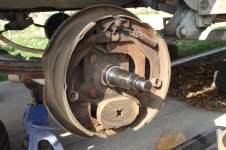here is an article
To a lot of people, the idea of using anything with the word "electric" in the water is a non-starter. But electric over hydraulic brakes on boat trailers are now an option on models built by EZ Loader, Magic Tilt, Pacific Trailers, and Loadmaster, to name just a few.
Like a purely hydraulic system, an electric over hydraulic (EOH) braking system is activated whenever the tow vehicle brakes are applied and the trailer surges forward. Unlike the older system, however, the EOH actuator is electric, so the trailer’s brakes are applied instantly, with almost no lag time.
"Electric over hydraulic brakes have the same hydraulic brake lines going to them," says EZ Loader's Rick Norman, whose company also offers electric drum brakes, "but instead of ending up on the forward end of the trailer with the familiar hydraulic actuator, they end up with a motor on the actuator that's powered by electricity from the tow vehicle. The result produces the necessary hydraulic pressure to activate the brakes." Depending on the brand you buy, an electric over hydraulic system is available for either disc or drum brakes. Like surge, there's an actuator designed for either, but be aware that 1,000 psi on an EOH brake system is used for hydraulic drum brakes while a higher 1,500 psi is used for disc brakes. Conventional surge brakes use a lower psi (400-800) but most brake lines can handle the higher pressure. And if you're leaning toward EOH, this is a question you need answered: Is the brake line burst strength strong enough for the increased pounds per square inch of brake fluid moving through the system? Federal law also requires a breakaway kit, including battery, installed on any trailer with EOH brakes so that the trailer brakes will activate in the event it becomes separated from the tow vehicle. Trailers with the standard surge brakes use a breakaway cable to do the same, should a separation occur.
Water and EOH
"You can't get the electric over hydraulic actuator wet," observes Trailering Club member Jim Favors, who has pulled his Ranger 27 tug from Washington state to Florida and back home to Michigan. "That's why the actuator is placed as far up the front of the trailer as possible. I have my wife Lisa stand outside when we back the trailer down the ramp to let me know when to stop."
This doesn't mean the actuator on an EOH system should be kept out of the rain. It's built to handle heavy weather while on the road, but manufacturers ask that it not be submerged at the boat ramp. Of course, in these days of power washes at boat ramps to remove any invasives (quagga or zebra mussels, to name two), boaters have expressed concern about using a high-pressure hose on a trailer with electric over hydraulic brakes. Since these actuators aren't designed to be submersible though the housing is weather-tight, most will tell you light rinsing is fine. As for power washing, avoiding the actuator altogether makes sense because it's not supposed to be in the water.
Brake manufacturers suggest using electric over hydraulic if the boat being pulled exceeds 3,500 pounds. This becomes all the more important when one considers that a boat that size being backed down a boat ramp with the conventional surge system is using only the tow vehicle brakes. Most of the time, it's not an issue, but as the boat gets heavier, more strain is put on the tow vehicle brakes. EOH uses both tow vehicle and trailer brakes when the boat is backed onto the ramp.
the rest at
http://www.boatus.com/magazine/traileri ... brakes.asp
maybe this will help

